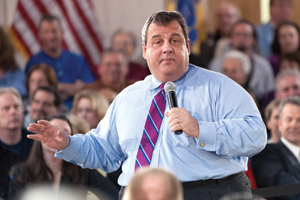Stalled politics killed New Jersey’s chance at legal sports betting 21 years ago. Now, the state is fighting for another opportunity to bring Las Vegas-style sports betting to the heavily populated tri-state area.
New Jersey is challenging the constitutionality of the Professional and Amateur Sports Protection Act of 1992, a federal statute that gives just four states a right others lack. The NCAA, NFL, NBA, NHL and Major League Baseball are in the other corner and claim expanded sports betting will harm their games.
A polarizing courtroom battle between elite legal minds is up next.
Handicappers say New Jersey is an underdog.
 |
N.J. Gov. Chris Christie signed legislation a year ago legalizing sports betting at the state’s casinos and horse tracks.
Photo by: GETTY IMAGES FOR EXTRA
|
Sponsored by then-New Jersey Sen. Bill Bradley and signed into law by President George H.W. Bush, PASPA prohibited sports betting nationally except in the four states that already were offering a form of sports wagering. Because of New Jersey’s established gaming industry, the state was given a one-year window to be grandfathered in with Nevada, Oregon, Montana and Delaware.
But the legislation that would have amended New Jersey’s constitution to allow sports betting never made it to the governor’s desk. “I would have voted for it — if it went through the committee system,” said Chuck Haytaian, who then was the New Jersey Assembly speaker. “It did not, so I got tagged with the line that I was opposed to it, but I wasn’t.”
Longtime state Sen. Ray Lesniak, who at the time was also chairman of the New Jersey Democratic State Committee, said he voted to put the sports betting bill on the ballot twice. William J. Pascrell III, who was working as counsel for New Jersey Gov. James Florio, said recently the governor was “opened-minded about sports betting.”
How it unfolded
Oct. 28, 1992: President George H.W. Bush signs into law the Professional and Amateur Sports Protection Act, prohibiting sports betting in all but four states.
Nov. 9, 2011: New Jersey voters, by a 2-to-1 margin, support a referendum to legalize sports betting.
Jan. 17, 2012: New Jersey Gov. Chris Christie signs legislation legalizing sports betting at the state’s horse tracks and casinos.
Aug. 7, 2012: NCAA, NFL, NBA, MLB and NHL file suit against Christie.
Dec. 21, 2012: U.S. District Judge Michael Shipp rules the leagues have standing for the lawsuit.
Jan. 22, 2013: U.S. Department of Justice informs the court it will intervene in the case.
Feb. 14, 2013: Oral arguments are scheduled to take place in Trenton, N.J.
But Haytaian didn’t want the legislation to proceed on a path different from what other legislation faced. The bill ultimately died at the Assembly Appropriations Committee.
Today, the challenge isn’t legislative as much as it’s judicial.
After getting overwhelming support for the subject from voters, Gov. Chris Christie signed legislation last January legalizing sports betting at the state’s casinos and horse tracks. A study conducted by Nevada gaming company Club Cal Neva projected that sports betting in New Jersey would generate $30.6 million in tax revenue annually. If the state wins the right to offer online gaming — a battle it’s also currently fighting — the projected tax revenue balloons to $166.2 million annually.
That’s especially important at a time when the state’s gaming industry is slumping. For the first 11 months of 2012, New Jersey casinos posted winnings of $2.8 billion, down 8 percent from the same period in 2011.
The sports leagues stand strongly in the way. U.S. District Judge Michael Shipp ruled in December that their lawsuit seeking to halt the legislation had standing, and the leagues now head into Feb. 14 oral arguments in Shipp’s Trenton, N.J., court as heavy favorites, especially after the U.S. Department of Justice announced Jan. 22 that it would intervene in the case.
“I’ve said from the outset that New Jersey faced an uphill battle on the issues themselves,” said Jeffrey Standen, a law professor and associate dean at Willamette University (Salem, Ore.), who has been following the case closely. Standen noted that the federal government generally enters cases where it deems it may have an advantage, but he added that such precedent doesn’t always dictate outcome.
A Department of Justice spokesperson had no comment.
The Issues
The National Gambling Impact Study Commission estimates $380 billion is wagered on sports in the United States annually. According to the Nevada Gaming Commission, approximately $33 billion was bet at Nevada sports books from December 2011 through November 2012.
That leaves a robust underground industry handling hundreds of billions of untaxed dollars. New Jersey’s desire is to make the in-state portion of that money taxable dollars — legalized sports gambling means it can regulate and thus tax the money — giving it a key jolt of new revenue.
 |
Clement
|
A former U.S. assistant attorney general, the late W. Lee Rawls, questioned PASPA’s constitutionality in a 1991 letter to then-chairman of the Senate Judiciary Committee Joe Biden. Similarly, in his response, Biden noted his opposition to the enactment of PASPA, saying it raised “federalism issues,” adding: “It is particularly troubling that [the legislation] would permit enforcement of its provisions by sports leagues.” That didn’t stop it from passing.
This month, two former U.S. solicitors general will again debate the constitutionality of PASPA. New Jersey is being defended by Theodore Olson,
 |
Olson
|
U.S. solicitor general under President George W. Bush. Olson’s successor, Paul Clement, is representing the leagues.
It’s not the first time Olson and Clement have squared off in a sports-based case. The two were on opposite sides of a matter in 2011, when the NFL’s labor dispute moved into the courtroom. Olson represented the players before the 8th U.S. Circuit Court of Appeals in St. Louis; Clement represented the NFL owners.
During the lead-up to Shipp’s ruling in December that the leagues’ lawsuit could proceed, NFL Commissioner Roger Goodell offered testimony on the matter. “The spread of sports betting,” Goodell said during that November testimony, “including the introduction of sports betting as proposed by the state of New Jersey, threatens to damage irreparably the integrity of, and the public confidence in, NFL football.”
New Jersey says there’s no proof of that and points to the amount of money currently being wagered on sports illegally and the NFL’s willingness to play games at Wembley Stadium in London, where sports betting is legal.
And while New Jersey battles it out at the state level, U.S. Reps. Frank Pallone and Frank LoBiondo are taking the fight to Washington, D.C., as well. A representative for Pallone said that staff members of both New Jersey congressmen are planning to meet this week to discuss reviving a congressional bill that would amend PASPA.
David Purdum is a writer living in Atlanta.






